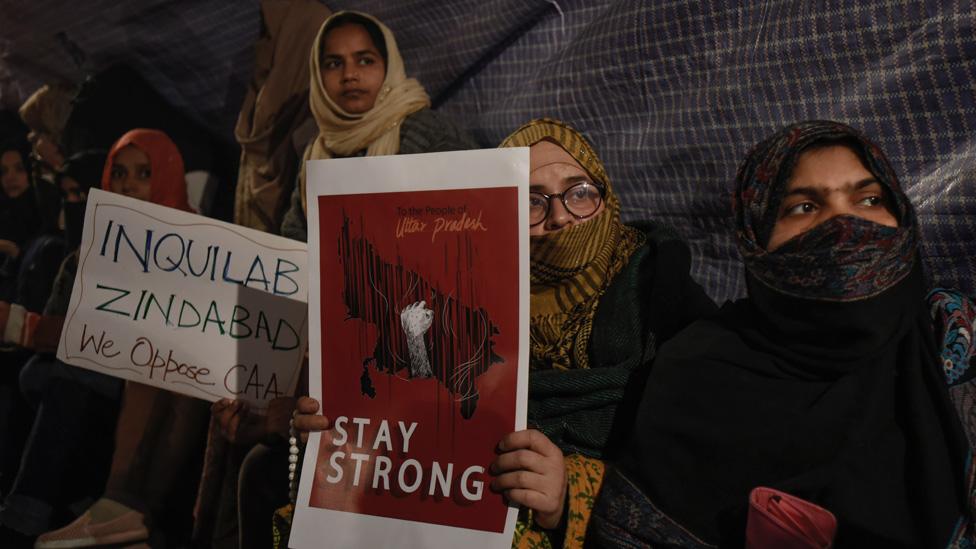Shaheen Bagh: Coronavirus clears long-running India citizenship protest
- Published

The Shaheen Bagh protesters had been demonstrating for 100 days
A long-running protest led mostly by Muslim women in the Indian capital has been cleared amid measures to curb the spread of coronavirus in the country.
The peaceful protest, against the controversial Citizenship Amendment Act (CAA), had been going on for months.
But with India imposing strict restrictions on public gatherings, police cleared the protest site on Tuesday morning.
Like the protest itself, this invoked strong reactions on social media.
The hashtag #ShaheenBaghEmpty was one of the top trends on Twitter on Tuesday.
Shaheen Bagh - a Muslim neighbourhood in the city - captured the imagination of many Indians.
It was one of the few times anyone can remember India's Muslim women coming out in such large numbers and leading a movement of this nature, although many others from different religions have sat alongside them in solidarity. They have read each other the preamble of India's constitution, made speeches reaffirming their citizenship and sung patriotic songs.
Many praised the tenacity of the protesters, calling them inspirational and thanking them for their perseverance.
Allow X content?
This article contains content provided by X. We ask for your permission before anything is loaded, as they may be using cookies and other technologies. You may want to read X’s cookie policy, external and privacy policy, external before accepting. To view this content choose ‘accept and continue’.

Allow X content?
This article contains content provided by X. We ask for your permission before anything is loaded, as they may be using cookies and other technologies. You may want to read X’s cookie policy, external and privacy policy, external before accepting. To view this content choose ‘accept and continue’.

Several petitions have also been filed in courts which argue that the law is illegal, they claim that it grants citizenship on the basis of religion, which goes against the country's secular values enshrined in its constitution. Those challenging it include political parties, civil society and Muslim groups.
But the protest was also criticised and most recently it was the target of a vitriolic state election campaign by the country's ruling Bharatiya Janata Party (BJP).
The BJP has accused the protesters of being "traitors" to India because of their opposition to the CAA, which offers amnesty to non-Muslim illegal immigrants from three neighbouring Muslim-majority countries.
Many of the BJP's supporters also subscribe to the view that the protests were unpatriotic.
Many of them have celebrated its end.
Allow X content?
This article contains content provided by X. We ask for your permission before anything is loaded, as they may be using cookies and other technologies. You may want to read X’s cookie policy, external and privacy policy, external before accepting. To view this content choose ‘accept and continue’.

Allow X content?
This article contains content provided by X. We ask for your permission before anything is loaded, as they may be using cookies and other technologies. You may want to read X’s cookie policy, external and privacy policy, external before accepting. To view this content choose ‘accept and continue’.

Three generations of one family join women camped out in a Delhi suburb in protest against the citizenship law